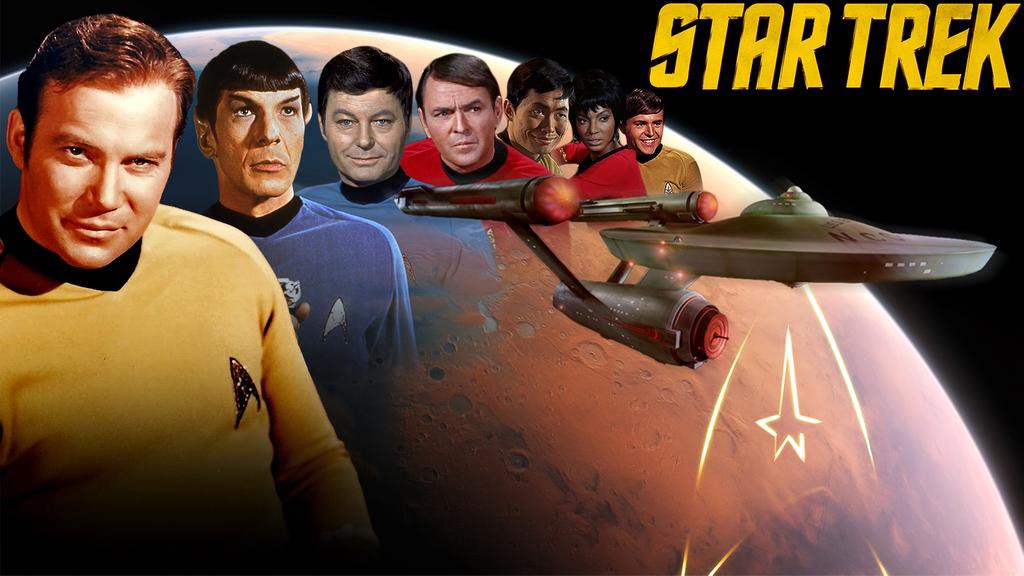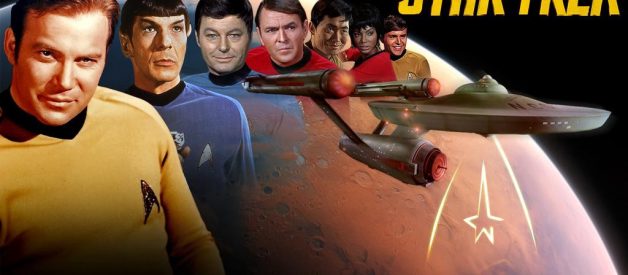Anatomy of a Sci-Fi TV Classic Amidst New Arrivals And Honorable Replicas
 Artwork by CommanderCool22 on Deviant Art
Artwork by CommanderCool22 on Deviant Art
Upon viewing the opening sequence of any random episode of the original 1960s Star Trek television series, such as, ?Miri? or ?Metamorphosis,? the viewer immediately knows what to expect: an entertaining ride. The story and action are set up in the tease, and boom ? the theme music commences and the segment begins to boil. The crew of the Enterprise begins a quest to some mystic or fantastic world. They receive a distress signal, or their journey is disrupted by an alien force who we?re certain at one point will zap at least one of the crew members across the planet?s surface with a resounding bolt.
Trek fans ultimately craved similar segments, and eagerly anticipated small-screen viewings upon hearing of The Next Generation?s debut (in 1987 via its first-run syndication). But after a while, as many critics observed, one kept waiting for something to happen.
But nothing ever did.
Oh, sure, the late, great DeForest Kelley from original Trek reemerged as Dr. Leonard McCoy for a cameo appearance in TNG?s pilot episode. And later, Leonard Nimoy?s Mr. Spock and even James Doohan?s Mr. Montgomery Scott came aboard that new edition of his Enterprise (in episodes, by the way, that just so happen to be the highest-rated and best-loved segments in Generation?s history). Even William Shatner?s iconic Captain Kirk made his way into the Next Generation universe when he paired with Patrick Stewart?s TNG character Captain Picard for the big-screen Star Trek Generations in 1994.
But the combined sacred triad of Shatner?s Kirk (stoicism), Nimoy?s Spock (logic), and Kelley?s McCoy (emotion) were nowhere to be seen in any weekly TV spot, where they ultimately belong.
The Originals Played By The Originals Back On TV
Truth be told, original and true Star Trek fans, ?Trekkers? and ?Trekkies? alike (the former is concerned with the show?s philosophy; the latter focuses on the more trivial [or ?Tribbial??] aspects of the series) never asked for the film series (the second of which, The Wrath of Kahn, released in 1982, is at least superior to the TV sequels), or a Next Generation, or new characters on a new ship Voyager, Enterprise, or (Yee gads!) Discovery.
At least, Enterprise was a well-made prequel that focused with panache on the formative years of the Federation, pre-Kirk, Spock, etc., while heaven only knows what Discovery, or (more Yee gads!) the new Star Trek: Picard series is doing.
It?s all very nice, but again, true ?Trekkies? and ?Trekkers? never received what was originally desired:
All-new adventures of the same wonderful original characters that we had come to know and adore, as played by the same original actors ?broadcast (and not streaming) on the small screen ? in our living rooms, every week.
That?s it.
Nothing else.
But that?s precisely what was not nor now will ever be received.
Roddenberry Wasn?t That Crazy About A Few ?Trek? Developments
Even Trek maestro Gene Roddenberry was displeased with the way the franchise developed after the first year of TNG. Rumor had it that he was also not fully satisfied with the original Trek feature films (which he wanted to circumvent around the adventures of the Enterprise, and not Kirk and Spock).
In truth, Roddenberry?s true resurrection of his original concept worshiped by millions never came to be. Instead, original Trek-lovers were treated to unfamiliar Trek sequels, produced from what looked to be a parallel universe ? and sometimes actually was (courtesy of A.J. Abrams and Alex Kurtzman, the creatives behind Discovery, Picard and the 2009 Trek reboot feature franchise).
Neither Deep Space Nine, Voyager, Enterprise, Discovery or Picard has lived up to the name of their legendary older brother/father. The Next Generation, ignited by Roddenberry was a worthy attempt (certainly in its very Star-Trek-Original-Series-esque first season), but after Roddenberry passed away (in 1991), TNG just didn?t cut the mustard.
And Deep Space Nine was a very nice science fiction program (especially upon viewing its last few seasons). But it wasn?t Star Trek, at least not any Trek that Roddenberry had in mind.
If Roddenberry-successor and subsequent 1980s-90s Trek franchise kings and executive producers Rick Berman, Abrams, Kurtzman, etc. wanted to create a new sci-fi military-bent about space travels, then he should have done that. But labeling Next Generation, Deep Space Nine, Voyager, Enterprise, and Discovery, and Picard as akin to Star Trek was and remains, well, as William l Shatner once stated early on the Trek revamp era, ?a misnomer.?
Even TNG essentially splitting the Kirk character in two (with Patrick Stewart?s Captain Picard and Jonathan Frakes? Number One), a poor man’s Spock (Brent Spiner?s Data), and a prettier-than DeForest-Kelley doctor (Gates McFadden?s Beverly Crusher), true Trek fans still pined for the charm of the original show, which never came to be.
?Trek?-Light
Other sci-fi media franchises, however, such as TV?s weekly Stargate SG-1 (based on the Kurt Russell 1994 feature film), delivered the goods.
The original small-screen SG-1, before it branched out into a few small-screen sequels of its own, not only outshines the TV Trek sequels (along with the Abrams/Kurtzman feature-film revamps), but also other sci-fi military small-screen classics like Babylon 5 (sorry, ?Fivers?) and even the initial Stargate motion picture (sorry, Kurt Russell-ers).
Certainly, there have been other solid sci-fi/academy-like contenders.
Although some of the alien make-up was hideous and insulting, and some of the characters, just plain silly, Roddenberry?s very own Andromeda syndicated series of the early 2000s (produced posthumously by his wife Majel ?Nurse Chapel? Barrett-Roddenberry) held up well. Others of that time, like Farscape, which aired on Syfy, was elegant and elaborate and reached a praised hierarchy in certain fandom quarters. And while a same-era show like that of Sliders nailed it a few times with imaginative stories, frequent character-replacements killed any sense of lengthy on-screen camaraderie. It would have been much cooler if the characters had been given a ship in which to travel through time ( instead of employing a Time-Tunnel/SG-1-like funnel effect).
Certainly, too, countless new sci-fi series takes from today, in general, are relatively impressive (if still way too dark and edgy).
But beyond Stargate SG-1, none of them ? and I mean none of them ? have ever come close to Star Trek: The Original Series. And even though the military crew on SG-1 never utilized an actual spaceship for their galactic journeys, at least their core travel portal was stationary, with solid outlets spanned across variant worlds.
Suffice it to say, SG-1 doesn?t disappoint on any level. The show employed spectacle, fancy, aptitude, humor, and adventure, all wrapped within a neat package that continues soar with entertainment and sophistication, displaying a media mosaic of imaginative, fictional disclosure.
Besides Star Trek: The Original Series, what else could any sci-fi TV fan want? SG-1 is exactly what any true post-original-Trek show should be (military-based or otherwise).
It?s A Sci-Fi Fantasy Palooza!
Today, the sci-fi/fantasy/all-media fan base has most likely never been so satisfied or saturated for that matter. Countless television shows and feature films of the genre shower the airwaves and streams and movie theatres, inclusive of DC Comics and Marvel-ignited product, and beyond.
Depending on who?s watching what version, Star Trek and Star Wars fans, in particular, are pleased with sequel after reboot or re-do of their beloved favorite franchises, despite a disparity in how various renditions of those individual Star worlds have been conceived, perceived or received.
And with the frequent invasion from those like Abrams and Kurtzman (sometimes into both the Trek and Wars worlds, to mixed reviews by both fans and fellow-creatives), with the newest Treks like Discovery and Picard, poorly or richly embraced (depending on who you talk to), at least there is a valiant attempt to keep the sci-fi/fantasy sector alive (although some would still argue if these fresh attempts are valiant).
So, this is as good a time as any to assess the sci-fi TV situation, beyond and including all shows Trek and beyond, but with specific regard to weekly Wagon Train to the Stars, which how is Trek creator Gene Roddenberry initially described Original Trek series when it debuted on NBC in 1966 (and in reference to a classic TV western which aired on ABC from 1957 to 1965).
And while there were some legal issues in the 1970s with the original Battlestar: Galactica TV series (created by Glen Larson, and which ran on ABC from 1978 to 1979) due to its alleged resemblance to the first big-screen edition of Star Wars (created by George Lucas, and which premiered in 1977), in that same era, sci-fi fans could not have been more pleased when Star Trek: The Motion Picture reignited Roddenberry?s beloved child which has proven to have no end.
What many do not remember, however, is that Roddenberry had originally slated Trek to return to the small screen with a concept he called Star Trek: Phase II. But by taking into account(ing) Warner Bros. receipts for Wars, Paramount, proprietor of Trek, switched gears and decided to bring Trek back in the big-screen guise of a Motion Picture.
But just as the initial 1965 TV pilot for Trek (?The Cage? was considered too cerebral, only to have the series sold to NBC due to a more action-packed second commissioned 1966 pilot (?Where No Man Has Gone Before?), Trek?s first 1979 Motion Picture was also considered too cerebral ? and made a less-than-stellar impression, only to have the feature film Trek franchise then be saved in 1982 by The Wrath of Kahn (because executive producer Harve Bennett studied his Trek-ology and had the TV division of Paramount produce the movie).
But still, with it?s original Trek cast nicely in place (including Ricardo Montalban reprising his Kahn guest role from The Original Series), The Wrath of Kahn did not make its debut on television ? again, where true Trek fans wanted to watch any new edition of the franchise.
Shows like Stargate SG-1 may have captured magnificently what other less worthy series in the planet-to-planet genre have ultimately failed to do, even ? and particularly ? the many small (and big screen for that matter) incarnations of Star Trek. And while Seth MacFarlane?s The Orville is a TV masterpiece of Trek mimicry in its own right, it clearly pays homage to Star Trek: The Next Generation and not The Original Series.
So, that doesn?t count.
And whereas SG-1 became everything Next Generation, Deep Space Nine, Voyager, or Enterprise attempted to be, should have become, and simply never became, it doesn?t look like either Discovery or Picard are going to improve that ratio. It seems like all of the post-Original Trek editions were created, partially, to right what many considered a central dysfunction of the original series: to expand upon character-driven stories, of which only a handful was featured.
Consequently, in the case of the ongoing voyages of the Trek franchise, too many rights made a wrong. The new Treks overcompensated with too much character development, and neglected the marvel of Roddenberry?s ethereal, original vision ? to explore strange new worlds ? to ?trek? to the stars?undiscovered countries, and to exude charm and exhilarate the audience in the process.
For many, the new Treks transmuted into L.A. Law In Space and Deep Space Blues. The characters talked and talked and talked and talked, but no one went anywhere with any legitimate sense of fancy, or imagination. Most of the Next Generation, Deep Space, and Voyager segments became, in effect, what used to be called ?bottle shows,? with all the so-called adventure taking place on board the Enterprise, the space station, or any other number of starships.
In essence ? where all the action wasn?t.
Is ?Star Trek: Kirk? The Answer?
Can it be that the 1999 hit feature film Galaxy Quest, a Trek satire if there ever was one, is actually a better science fiction entry into the fold than any of the Star Trek big or small screen sequels put together? Quest certainly equaled in entertainment value any one episode of the original Trek TV show.
So, let?s face it: no new Trek, rebooted-Trek, or fake-Trek, on the big or small screen, will ever take the place of the original 1960s Trek TV series. And to drive the point home one more time ? all true Trek fans ever wanted will simply never come to fruition:
Captain Kirk, Mr. Spock, and Dr. McCoy, et al, back on TV played by William Shatner, Leonard Nimoy, and DeForest Kelley, et al. At least when Nimoy and Kelley, and the amazing James Doohan were still alive, there was still a chance of that happening.
But not now.
Although maybe, just maybe ? something like Star Trek: Kirk ? reuniting Shatner with Nichelle Nichols as Lt. Uhura, George Takei as Mr. Sulu, and Walter Koenig as Mr. Chekov ? back on a new weekly TV series ? would satiate if only a measure of the original Trek?s apparently insatiable need.
Maybe.


